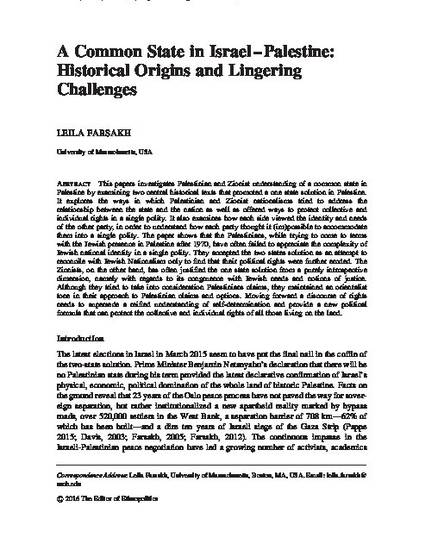
Article
A Common State in Israel-Palestine: Historical Origins and Lingering Challenging
Ethnopolitics, 2016 Vol. 15, No. 4, 380–392,
(2016)
Abstract
This papers investigates Palestinian and Zionist understanding of a common state in
Palestine by examining two central historical texts that promoted a one state solution in Palestine.
It explores the ways in which Palestinian and Zionist nationalisms tried to address the
relationship between the state and the nation as well as offered ways to protect collective and
individual rights in a single polity. It also examines how each side viewed the identity and needs
of the other party, in order to understand how each party thought it (im)possible to accommodate
them into a single polity. The paper shows that the Palestinians, while trying to come to terms
with the Jewish presence in Palestine after 1970, have often failed to appreciate the complexity of
Jewish national identity in a single polity. They accepted the two states solution as an attempt to
reconcile with Jewish Nationalism only to find that their political rights were further eroded. The
Zionists, on the other hand, has often justified the one state solution from a purely introspective
dimension, namely with regards to its congruence with Jewish needs and notions of justice.
Although they tried to take into consideration Palestinians claims, they maintained an orientalist
tone in their approach to Palestinian claims and options. Moving forward a discourse of rights
needs to supersede a reified understanding of self-determination and provide a new political
formula that can protect the collective and individual rights of all those living on the land.
Keywords
- one state,
- Palestinian state,
- Sovereignty,
- PLO,
- Jewish and Palestinian Nationalism
Disciplines
Publication Date
Fall October, 2016
Citation Information
Leila Farsakh. "A Common State in Israel-Palestine: Historical Origins and Lingering Challenging" Ethnopolitics, 2016 Vol. 15, No. 4, 380–392, (2016) ISSN: http://dx.doi.org/10.1080/17449057.2016.1210348 Available at: http://works.bepress.com/leila_farsakh/23/
